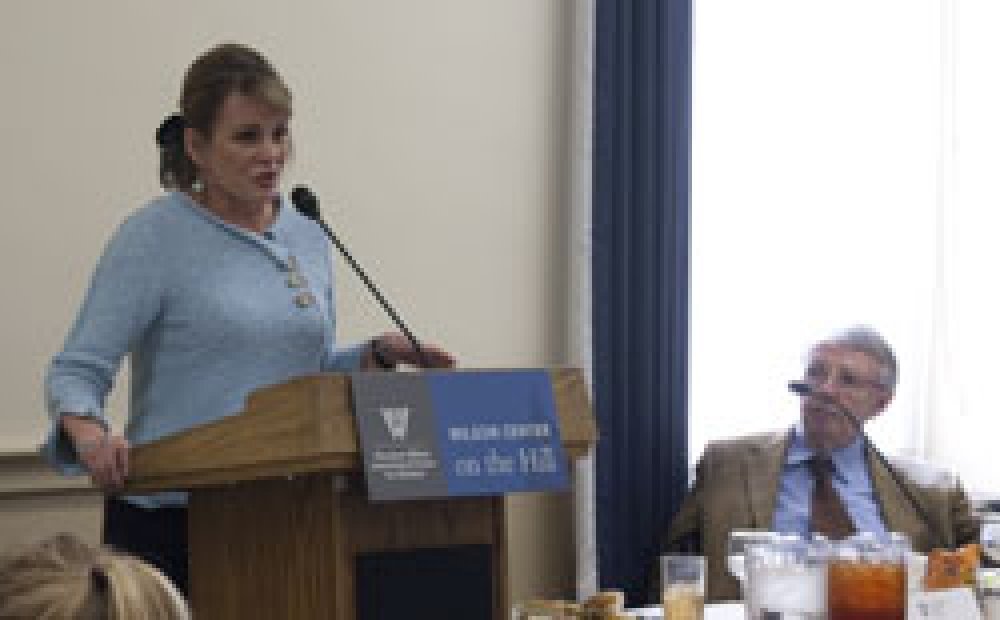The Changing Politics of Oil: Implications for U.S. Energy Security

Occurring on February 11, 2011 and less than an hour after Hosni Mubarak stepped down after nearly three decades of rule as President of Egypt as head of , a Wilson Center on the Hill panel examined the relative political environments of oil producing states across the Middle East and North Africa (MENA), the need for diversification of America's energy supply, and other concerns related to energy security in the region. The event was moderated by David Klaus, consulting director of the Wilson Center on the Hill program.
David Ottaway, senior scholar at the Woodrow Wilson Center and former journalist who covered the region for the Washington Post and the New York Times, suggested that the relationship between oil production and politics is limited, noting that production and export of oil continued unabated during prior instances of instability in Middle Eastern oil-producing nations. . He cited examples of this phenomenon in Angola, where following a struggle between pro- and anti-Communist, Cuban troops made sure oil continued to flow, and in Algeria, where despite an ongoing civil war, a Texas oil company was able to begin drilling.
Ottaway also made several observations about present developments in the region. He noted that both Algeria and Libya were facing so-called "days of rage" in the form of planned popular protest. He raised the possibility that in Sudan, although the volume of oil production is comparatively low, third party groups might sabotage pipelines to get attention. Meanwhile, in Egypt, he observed, turmoil and instability could lead to some striking and discontent among workers on the Suez Canal, which is the critical route through which a significant amount of Middle East oil reaches world markets. Most presciently, Ottaway suggested that public uprisings and changes in leadership in Egypt and Tunisia – the countries that border Libya to the east and west – should be of great concern to Moammar Gaddafi, who having taken control over 30years earlier was now the longest-standing autocratic leader in the region.
Congressman Bobby L. Rush (D-IL) emphasized the importance of African issues in general while also focusing on the significance of the present turmoil across the Middle East. He described the United States as being witnesses to important changes in the world. On the oil issue, the Congressman emphasized the importance to the United States of diversifying energy sources, both through clean technology and by getting oil from areas such as the Gulf of Guinea. According to Congressman Rush, the future of the U.S. economy will depend heavily upon achieving the goal of making the U.S. more flexible in meeting its energy needs.
Melanie Kenderdine, the executive director of the MIT Energy Initiative, shared her personal views on the recent developments, noting that she was not speaking on behalf of that program. She described Egypt within the energy landscape of the Middle East, noting that although the nation is not a major oil producer, it is very important in the natural gas industry. In addition, the Suez Canal, she said, handles 7.5 percent of the world's sea trade, 4.5 percent of the global oil supply, and is a convergence points for the the U.S. military fleets. According to Kenderdine, the Mediterranean is critical to the interests of our allies -- 65 percent of the gas consumed in Western Europe goes through the Mediterranean. For Egypt itself, she said restoring stability is very important, as the country has lost $3 billion since the beginning of the crisis and several oil companies, such as Shell, have halted drilling or removed personnel and families. However, Kenderdine emphasized that factors ranging from OPEC's surplus production capacity to the existence of large oil tankers significantly reduce the effect that a possible closure of the Suez Canal would have on U.S. energy supplies and security. .At the same time, she said, the U.S. needs to reduce its dependence on oil, including through initiatives such as flex fuel vehicles that effectively reduce oil's value as a strategic commodity.
Rachel Barker, Intern, Wilson Center on the Hill
David Klaus, Consulting Director, Wilson Center on the Hill
Speakers

Former Washington Post Middle East Correspondent
Hosted By

Africa Program
The Africa Program works to address the most critical issues facing Africa and US-Africa relations, build mutually beneficial US-Africa relations, and enhance knowledge and understanding about Africa in the United States. The Program achieves its mission through in-depth research and analyses, public discussion, working groups, and briefings that bring together policymakers, practitioners, and subject matter experts to analyze and offer practical options for tackling key challenges in Africa and in US-Africa relations. Read more
